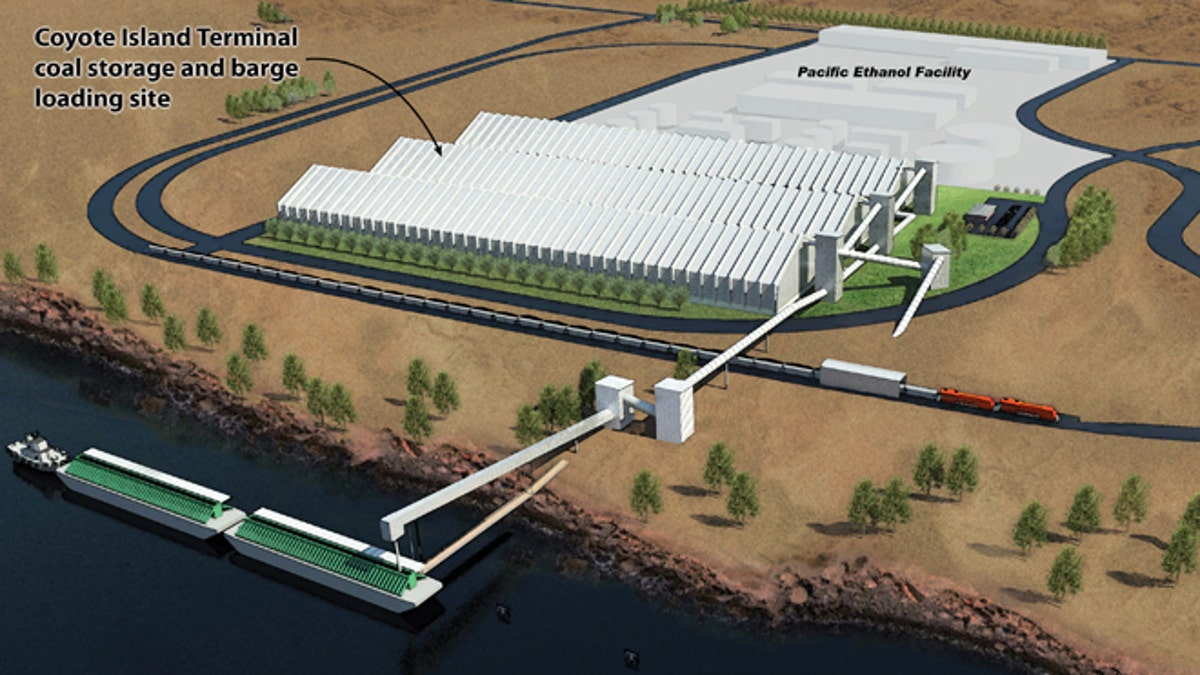
Rendering of the Coyote Island Terminal coal storage and barge loading site, courtesy of MorrowPacific / Port of Morrow. (US Army Corp of Engineers, Portland District)
The coal industry has been dealt another blow after a state agency in Oregon denied a key permit for a controversial terminal, marking the latest salvo in an escalating fight between coal exporters and fossil-fuel loathing environmentalists on the West Coast.
The permit, for the Coyote Island Terminal in Oregon, was denied on Aug. 18 by the Oregon Department of State Lands (DSL). Though opponents rejoiced, the company building the dock, which would be used to transport tons of coal down the Columbia River, cited it as a potential economic boon – and questioned whether politics were at play in the permit rejection.
The terminal would serve as the starting point in a shipping operation that would eventually stage and ship upwards of 8 metric tons of coal over land and river, and then onto buyers in Asia.
After the rejection by the state, the company is holding out hope that the feds will side with them as part of a separate review.
“We’re disappointed, but it’s not the end,” said Liz Fuller, spokeswoman for the Australia-based Ambre Energy, which wants to build the terminal as part of its $242 million Morrow Pacific project.
The Oregon Department of State Lands (DSL) denied Ambre the permit after concluding the project is “not consistent with the protection, conservation and best use of the state’s water resources, and that the applicant did not provide sufficient analysis of alternatives that would avoid construction of a new dock and impacts on tribal fisheries.”
Fuller says the project had already received three permits through the Oregon Department of Environmental Quality. But she said this one might have been killed due to “political considerations.” Not only was it opposed by big environmental groups, 86 elected officials, 600 business, physicians and tribal groups, according to the Sierra Club, but Oregon Gov. John Kitzhaber publicly opposed it beforehand, and praised DSL’s Aug. 18 decision afterward.
Fuller said Ambre has 21 days to appeal DSL’s decision within the state and is leaning in that direction. Separately, the company hopes that, despite the Obama administration's tough-on-coal policies, the U.S. Army Corps of Engineers might give the green light as part of its own review, boosting their case.
Coal industry advocates say the project could help fuel a growing export industry, as well as the nation’s economy. A report released earlier this summer by the National Mining Association says U.S. coal to Europe and Asia added $16.6 billion to the U.S. economy in 2011.
"These findings underscore the potential for other states, especially on the West Coast, to benefit economically from sharply rising coal demand from Asia projected over the coming decades," NMA President Hal Quinn said in a statement at the time.
The Morrow Pacific project requires permits from both the state and the U.S. Army Corps of Engineers. The project cannot go forward without all permits in place. But while DSL looked at economic, social and other public benefits of the dock before denying the permit, the Corps is reviewing the proposal through a much more narrow set of criteria.
That might make it easier for the proposal to pass with the feds, advocates say.
Though the Army Corps of Engineers has not said it would approve the project, a spokesman told FoxNews.com Thursday that they are using a simpler template to review the viability of the project, rather than the wider impact assessments that DSL used.
“Our permit is limited to the impact of the specific activity on the waterway, so in this case, it’s the building of the dock,” he said. “River traffic, shipping coal – burning coal – some of these fall under the jurisdiction of other agencies but they are beyond the regulation or expertise of the Army Corps of Engineers.”
According to Luke Popovich, spokesman for NMA, coal has been the fastest growing fossil fuel in the last nine years, and the developing world has a vast need for energy. “We have the most of what the world wants the most of,” Popovich said, adding that a “well-orchestrated campaign” by environmentalists has been successful in stymieing efforts to get port terminals set up to export coal resources from those western states more effectively.
This is not the first time that public pressure has threatened the roll-out of a new energy venture in Oregon. In 2010, NorthernStar Natural Gas halted its plans to build a $650 million liquefied natural gas terminal on the Columbia River after the state and activists raised safety and environmental concerns. And in 2013, energy company Kinder Morgan pulled its proposal to transport coal via train from the Powder River Basin region to a facility at Port Westward in Oregon after protracted public opposition to the project.
Industry efforts to boost coal exports are coming at a time when the Obama administration is announcing new federal emission standards in an effort to curb pollution, putting heavy pressure on the industry. And just this week, The New York Times announced the White House is seeking to sign an international agreement that would compel countries to cut emissions without seeking a vote in the Senate.
Brett Vandenhuevel, executive director of Columbia Riverkeeper, a river watchdog group that fought against the Ambre dock permit, said the project’s impact on air and water quality cannot be minimized, and that is why “the opposition was unprecedented,” with thousands of people attending the rancorous public hearings.
Concerns ranged from dirty coal spilling out of trains and onto the land and in the water, to the impact on the habitat and endangered species like native salmon. They warned of coal dust during transport, but also pollution and climate change, as a result of long-term fossil fuel burning.
“People really took a stand and said they don’t want to be a conduit for dirty coal,” said Vandenhuevel.
Fuller said Ambre had taken every environmental impact concern into consideration when designing the Coyote Terminal dock. “It’s been tough,” she said, “but we really feel that our project really met Oregon state standards.”




